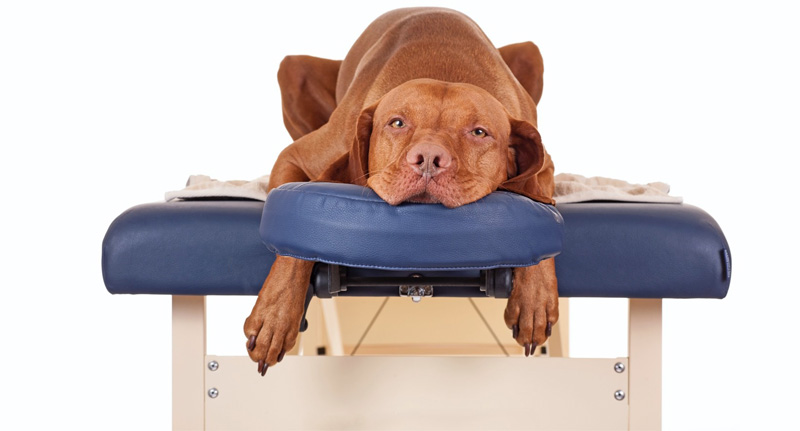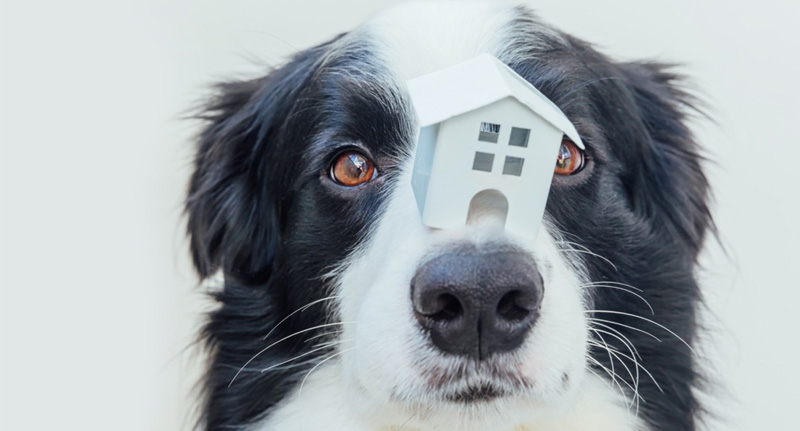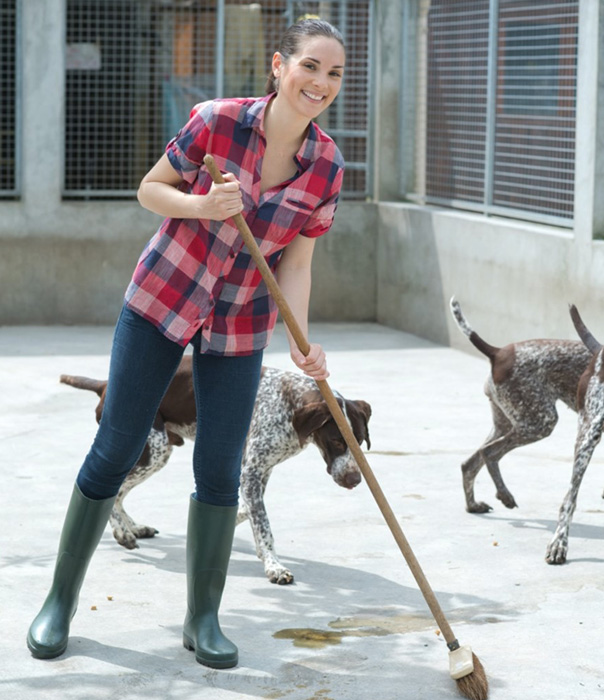Until people can take their furry friends with them on holiday, their next best option is to find them their own doggy hotel. Here Fido is pampered, exercised, and given all the belly rubs, love, and top-quality nosh he requires.
Hardworking single dog owners are a lot more likely to day board their dogs, also known as doggy day care.
The possibilities are endless and the market is ever-growing. So what’s the best way to do it?
1. Choose Your Target Market – High-Brow, Mid-Market, Or Budget
You need to identify your target market well in advance of writing your business plan, because it’s going to impact everything you do afterwards.
The days of dank wire screen cages and cold cement floors have (thankfully) gone the way of the dodo, but there’s still a huge range to choose from.
You can go for the star experience, complete with things like spa treatments, pedicures, massages, wagyu beef treats and corresponding prices. Being the first to bring in a popular overseas trend can make your name and fortune, and there’s a market for exclusivity.
If you aim more for the mid-market, where people want a touch of luxury but not break their bank accounts, you can have larger premises and a bigger intake of dogs. In this market, doggy day-care alongside long term boarding is going to be a great target for you.
The budget market is shrinking when it comes to pets. People treat their dogs like furry children, and no loving parent wants to be accused of not giving their baby the best possible treatment. People won’t book you if you’re too cheap. You’re fighting a psychological, emotional and financial block.
That said, everybody loves a bargain, so if you position it cleverly, you can still aim for part of the budget market.
You need to make sure your area can support your kennel. It’s pointless to set up a five star pet hotel with corresponding prices when your local client market wants a mid-market doggy day-care with some overnight boarding options.
The reverse is also true. Set your bar too low when your local area is crying out for a luxury dog kennel, and you’ve limited your income before you’ve opened your doors.
Top Target Market Tip: Research your area thoroughly before deciding. Don’t rush this step.

2. A Good Business Plan Makes Financing A Lot Easier
Setting up a dog kennel business properly is a costly exercise, and you’ll need financial backing. A good business plan gives your backers confidence and shows you where you might be missing some key details.
Having a business plan with defined, achievable goals and deadlines makes your business more likely to succeed and grow.
Top Business Plan Tip: Get as much information into your plan as you can to start with. You can always prune this back later.
3. Do Nothing Without A Good Insurance Policy
You need liability insurance as a bare minimum for your dog kennel business. It’s not just good business sense, it’s a legal and licensing requirement for most local authorities.
You’ll need employer’s liability insurance if you have any employees or volunteers. The other two main core policies you’ll want are public liability and professional indemnity.
Build your insurance around these three main areas.
Find a good insurance policy tailored towards working with animals. You can get policies especially for kennel owners and work with the company to make sure it fits your needs. There are packages that cover every situation from vet call-out fees to theft and straying. You’ll even get cover for losing your keys to the kennels and needing an emergency locksmith.
Top Insurance Tip: If you have staff living onsite, make sure you get good contents insurance as well.

4. Location Can Narrow Your Choices
Not all dog kennel businesses are large operations. You can start small and operate a very upmarket, very successful business with only a couple of dogs on the premises.
An air of exclusivity and unique offerings like onsite grooming, paw massages, gourmet meals and pet psychologists on call are all options that will put you head and shoulders above your competition.
The biggest market narrower for your dog kennel business comes down to location: where you’re based, where you want your kennels to be, where your clients are coming from – and what they want for their dogs.
If you already own your property and have planning permission, you can build new kennels on your land. You can also convert part of your home or outbuildings. In a residential area, this will means restrictions on the number of dogs you’ll get a license for due to noise concerns.
If you’re out in the countryside with a large bit of property and the room to spread out your kennels, the only limit is going to be your budget. Start small and add to it as your business becomes profitable.
You also have the option of buying an existing kennel and taking it over. If you go this route, make sure the existing business has a good reputation before making the investment, even if you plan on rebranding.
Even so, you’ll need to ensure it’s completely up to code to get the license re-issued without any problems. Get the entire property surveyed before making any offers, and be warned – existing kennels are expensive to buy.
And of course, you can buy land and build from scratch – but make sure you’re following all code requirements.
Top Location Tip: If you live near a travel hub or tourist hot spot, make sure you advertise there.
5. Staffing and Policies
Working the kennels is a physical job, and you’ll be constantly on the move.
From physical work in the kennels to dealing with clients, to checking the paperwork, your day is going to fly past, and if you’re running a large kennel you’re going to need to hire the staff to help you out.
You’ll need written policies for your staff and volunteers.
These policies must cover everything from staff training to transportation and emergency plans, and all staff need to know where to find them.
If you’re aiming for 4 or 5 stars on your license, you’ll need staff with appropriate qualifications in working with animals. You’ll also need the right ratio of staff to dogs available. It’s a good idea to get staff that are comfortable with admin duty as well as dog care.
Don’t forget you’ll need someone to inspect the dogs in the off-hours, so you’ll have staff living on site.
You need reliable, calm, confident people who can handle the general public and love working with dogs.
Certificates and qualifications aren’t a legal requirement to work in a kennel, but staff with these qualifications are a major asset to your business. They have the expertise to reassure customers, and the experience to help you and the animals, and these credentials on your website help establish you as a serious contender.
Top Staffing and Policies Tip: Offering to pay for these qualifications will help motivate your younger staff members and volunteers. Getting your own certificate in dog behaviour is going to help you as you launch.
6. Get Hands-On Experience First
Getting a certificate in dog training and behaviour is an excellent start in your new career, and a nice addition to your website, but you can’t beat actual hands-on experience.
Spend a few months volunteering or working at a kennel facility yourself to get an idea of what the business is like. It will show you what pitfalls to avoid, and how to get the best out of your staff when your business opens up.
Take notes on what worked, what didn’t, and what should’ve been done. It’s always easier to make a judgement call when you’re not emotionally invested, and that’s what you’re doing here.
Once you’ve got your place up and running, you can get your old colleagues to come over and give you some useful feedback.
Top Experience Tip: Don’t burn your bridges when you leave! Kennels often get full at peak times and will recommend other places to potential clients.

7. Website and Social Media
The first thing a customer does when they’re searching for a kennel is go online. The first thing a customer will do when they hear about your kennel, or see your advert, is go on line and look for your website.
The second thing they’ll do is check reviews.
Make sure you’ve got your website up and running with a valid contact number and email address as fast as possible. Spend some money and hire a website designer; preferably one who will take over the headache of sorting out hosting and site maintenance for you.
Hire a photographer to make sure you have great, high-quality pictures up of the kennels, and set up a couple of doggy cams in the communal play areas.
Doggy cams are a huge draw for customers. They can jump online and see their pup in the communal play areas, and even their pen, depending on your setup. It’s a brilliant reassurance that their dog is getting the best care and living her best life, even without her favourite human sneaking her treats.
Keep your own personal social media and your business life completely separate on-line. If you must attach your business details to your personal media, set up a separate, private profile just for close friends and family and keep anything that’s even slightly off colour or incendiary on that.
Have a robust social media policy in place for your staff and volunteers. Make sure all staff and volunteers are well trained on it and spend the time to go through carefully – it only takes one inflammatory post to do a huge amount of damage to your business.
Top Social Media Tip: Consider hiring a social media guru to do your posting for you. They can handle everything from online interactions to Facebook ads, and a good social media manager is worth their weight in gold.
8. Vet on Call
One of your biggest allies is going to be your local vet. You need a vet to deal with every day issues like long-term boarders that need medical attention, animals with chronic conditions, accidents, and in the worst case scenario, euthanasia.
Top Vet Tip: If possible, find a vet that will make on-site calls. This will result in less stress to the animal, which is always a good thing. These calls might be covered by your insurance policy, depending on your package.
Owning a dog kennel can be one of the most entertaining, frustrating, and rewarding things you do, all on the same day.
When dog kennel businesses fail it’s usually for one of two reasons. People go into them starry-eyed because they love dogs but are fuzzy on business details, and don’t get organised. Or they only have an eye for profit and no liking at all for the animal.
Ideally you need a mix of both and a good head for organisation to stay on top of the paperwork and turn a profit.
An average morning in the kennel can have a checklist ten items long or more:
- Laundry
- Pen cleaning
- Feeding
- Medication
- Vet Check
- Morning exercise
- Phone/email queries
- Onsite customer drop off and pick up
- Consumables Stock Check
- Consumables Orders
And that’s before lunch.
You’ll need to give the dogs individual attention and love, give owners guilty at the separation reassurance, make sure the pens are clean, and be able to tell if a dog is looking a bit off-colour and needs a check-up, all while ordering more specialised food for a flatulent Pekinese with missing teeth.
Meanwhile the Great Dane with separation anxiety just ate his bedding for the third time this week because the Chihuahua he bonded with went home and nobody else wants to be his cuddle bunny, and it turns out the St. Bernard that came in yesterday has a special hatred for the postal service and can’t be outside for fresh air exercise during mail delivery.
While you deal with Cujo, you’re sorting out staffing schedules, client pickups and drop-offs, invoicing and payments, marketing and social media posts.
In short, this is the perfect business for you if you thrive in a busy, non-stop environment.